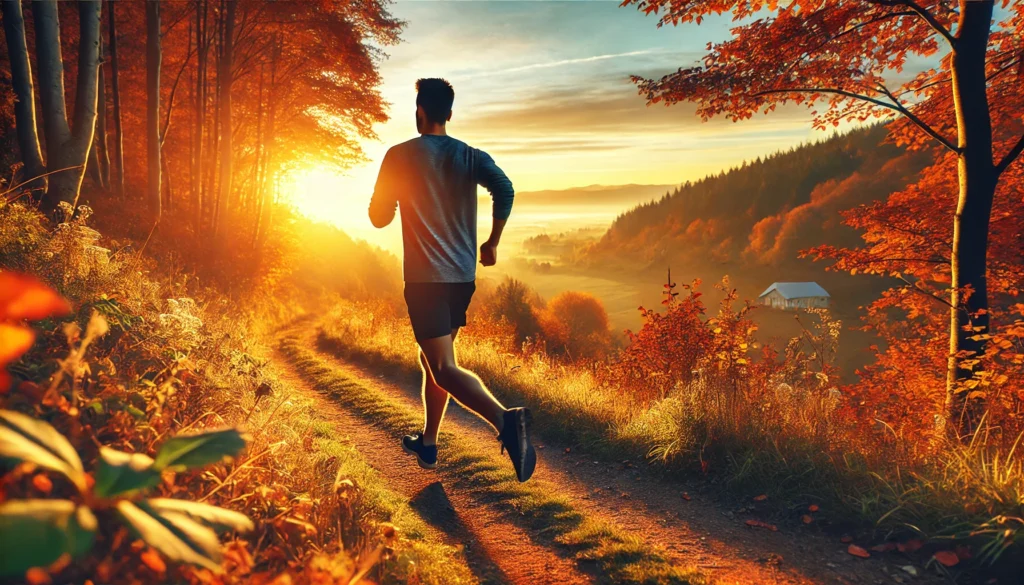In our fast-paced, modern world, stress has become an almost ubiquitous part of daily life. While some level of stress can be motivating, chronic stress can severely impact mental and physical health. One of the most effective ways to combat stress is through physical activity, which has been scientifically proven to reduce anxiety and improve overall well-being. In this article, we delve into the top 10 physical activities that are most effective for stress relief, supported by scientific evidence and expert insights.
You may also like: How Stress Affects Your Memory Function
1. Walking: The Simple Path to Calm
Walking is one of the simplest yet most effective forms of exercise for reducing stress and anxiety. Engaging in a brisk walk allows your body to release endorphins, which are chemicals in the brain that act as natural painkillers and mood elevators. Regular walking not only improves cardiovascular health but also provides a meditative experience, allowing you to clear your mind and focus on the present.
The Psychological Benefits of Walking
Walking provides an opportunity to disconnect from the digital world and engage with nature or your surroundings, which can be incredibly therapeutic. Studies have shown that walking in green spaces can elevate mood and decrease feelings of depression. This simple act of moving through a serene environment can significantly enhance mental well-being.
Walking as a Form of Meditation
The repetitive nature of walking allows for a form of meditation, often referred to as “walking meditation.” This practice involves focusing on the rhythm of your steps and your breathing, helping to center your thoughts and reduce stress. Walking meditation can be easily incorporated into daily life, making it a practical tool for stress management.
Building a Routine: Walking for Stress Management
To maximize the stress-relieving benefits of walking, consider establishing a regular routine. Whether it’s a morning stroll or an evening walk, consistency can deepen the positive effects on mental health. Over time, this routine can become a cherished part of your day, providing a reliable source of relaxation and clarity.
How Does Walking Help with Anxiety?
Walking is particularly beneficial for those dealing with anxiety as it provides a gentle, accessible way to elevate mood without the intimidation of more intense workouts. Research indicates that even a short walk can significantly decrease anxiety levels, making it an ideal activity for those looking to alleviate stress without overwhelming themselves.
2. Running: The Runner’s High Explained
Running is often hailed as a powerful stress reliever, thanks to the phenomenon known as the “runner’s high.” This euphoric state is attributed to the release of endorphins during prolonged aerobic exercise, which can produce feelings of happiness and relaxation. Moreover, running has been shown to improve sleep quality, boost self-esteem, and reduce symptoms of anxiety disorders.
The Science Behind the Runner’s High
The runner’s high is more than just a myth; it’s a scientifically recognized phenomenon. During prolonged running, the body releases a flood of endorphins, which are neurotransmitters that enhance mood and reduce pain perception. This natural chemical boost not only lifts spirits but also provides a sense of tranquility and well-being.
Running as a Form of Stress Release
For many, running serves as a physical outlet for stress and tension. The rhythmic pounding of feet on pavement can be cathartic, allowing individuals to channel their stress into movement. This physical release, combined with the endorphin rush, makes running a potent tool for managing stress.
Integrating Running into Your Lifestyle
To reap the stress-relieving benefits of running, consider setting achievable goals and gradually increasing your distance. Joining a local running group or participating in community races can also provide motivation and social support. These strategies can help make running a sustainable and enjoyable part of your stress management routine.
Can Running Cure Anxiety?
While running alone may not “cure” anxiety, it can significantly reduce symptoms and improve mental health. Regular runners often report feeling more focused, energized, and less prone to stress, making it a valuable tool in managing anxiety.

3. Yoga: Finding Balance and Peace
Yoga combines physical postures, breathing exercises, and meditation to foster a state of mental clarity and physical relaxation. It is widely recognized for its ability to reduce stress, lower blood pressure, and improve heart function.
The Mind-Body Connection in Yoga
Yoga emphasizes the connection between mind and body, promoting mindfulness and awareness of the present moment. Through deliberate movements and focused breathing, practitioners learn to tune into their body’s signals, helping to manage stress and anxiety more effectively.
The Role of Breathing in Stress Reduction
Breathing exercises, or pranayama, are a core component of yoga that aids in stress relief. Deep, controlled breathing helps activate the parasympathetic nervous system, inducing a state of calm and relaxation. These techniques can be practiced anywhere, providing an accessible tool for stress management.
The Impact of Consistent Yoga Practice
Regular yoga practice has been shown to lower cortisol levels, the hormone associated with stress, and increase serotonin production, which enhances mood. This hormonal balance not only reduces stress but also promotes a sense of peace and well-being over time.
Why Is Yoga Effective for Stress Relief?
The practice of yoga encourages mindfulness, which helps individuals stay grounded in the present moment and diminishes ruminative thoughts. Studies have shown that consistent yoga practice can decrease cortisol levels, the primary stress hormone, and increase serotonin production, which enhances mood.
4. Tai Chi: The Art of Moving Meditation
Tai Chi is a gentle form of martial arts that focuses on slow, deliberate movements and deep breathing. Known as “moving meditation,” Tai Chi promotes relaxation and stress reduction by fostering a mind-body connection.
The Philosophy Behind Tai Chi
Originating from ancient China, Tai Chi is rooted in the philosophy of balance and harmony. Its movements are designed to flow seamlessly, reflecting the natural balance of yin and yang. Practicing Tai Chi encourages a harmonious state of mind, reducing stress and promoting well-being.
The Physical and Mental Benefits of Tai Chi
Tai Chi offers numerous physical benefits, such as improved flexibility, balance, and strength, which contribute to overall health. Mentally, the focus required during practice helps shift attention away from stressors, allowing practitioners to experience a meditative state and reduce anxiety.
Incorporating Tai Chi into Daily Life
Tai Chi can be practiced almost anywhere, making it a versatile option for stress relief. Many find that starting their day with a Tai Chi routine sets a peaceful tone, while others prefer it as an evening ritual to unwind. Classes and online tutorials can provide guidance for beginners.
How Does Tai Chi Help with Anxiety?
Tai Chi’s emphasis on controlled movements and breathing helps calm the nervous system and reduce stress-related symptoms. Participants often experience improved mood, enhanced concentration, and reduced levels of anxiety, making it an excellent option for stress relief.

5. Swimming: Dive into Relaxation
Swimming is a full-body workout that not only builds physical endurance but also promotes relaxation. The rhythmic nature of swimming and the sensation of being in water can have a soothing effect on the mind and body.
The Therapeutic Effects of Water
Water has long been associated with healing and relaxation. The buoyancy reduces the impact on joints, allowing for a gentle yet effective workout. The sound and sensation of water can create a calming environment, helping to alleviate stress and promote mental clarity.
Swimming as a Mindful Practice
Swimming encourages a focus on breathing and form, creating a meditative experience. As swimmers glide through the water, they often find themselves lost in the rhythm of their strokes, which can lead to a peaceful, mindful state and reduce stress.
Building Swimming into Your Routine
For those looking to incorporate swimming into their stress management routine, consider finding a local pool or natural body of water. Setting aside dedicated time for swimming can provide a consistent source of relaxation and physical health benefits.
Does Swimming Reduce Stress?
Swimming can significantly reduce stress by encouraging the release of endorphins and decreasing muscle tension. Furthermore, the buoyancy of water supports the body, providing a sense of freedom and weightlessness that can alleviate stress and anxiety.

6. Cycling: Pedal Your Stress Away
Cycling, whether on a stationary bike or through scenic routes, is an excellent cardiovascular exercise that can boost mood and decrease stress levels. The repetitive motion of cycling and the focus required to navigate paths or trails provide a meditative experience.
The Benefits of Outdoor Cycling
Cycling outdoors offers the additional benefit of connecting with nature, which has been shown to reduce stress and improve mental health. The changing scenery and fresh air can refresh the mind, providing a break from daily stressors.
Cycling as a Group Activity
Joining a cycling group can provide social support and motivation, enhancing the stress-relieving benefits of the activity. The camaraderie and shared experiences can foster a sense of belonging and reduce feelings of isolation, which are crucial for mental well-being.
Making Cycling a Habit
To fully enjoy the stress-relieving benefits of cycling, consider integrating it into your daily routine. Whether it’s a short ride to work or a leisurely weekend journey, regular cycling can become a cherished part of your lifestyle, promoting physical and mental health.
How Does Cycling Help with Anxiety?
Cycling helps regulate the body’s stress response by lowering cortisol levels and increasing endorphins. Additionally, outdoor cycling offers exposure to nature, which has been shown to further reduce stress and improve mental health.
7. Dancing: Express and De-Stress
Dancing is not only a fun and social activity but also an effective way to relieve stress. It combines physical movement with music, allowing for creative expression and emotional release.
The Joy of Movement in Dance
Dance provides a unique combination of physical exertion and creative expression. The act of moving rhythmically to music can be exhilarating, allowing individuals to release pent-up energy and stress while boosting mood.
Dance as a Social Connector
Participating in dance classes or social dance events can foster connections and friendships. The social aspect of dance provides emotional support and a sense of community, which are essential for reducing stress and improving mental health.
Exploring Different Dance Styles
With numerous styles to choose from, such as salsa, hip-hop, or ballroom, there’s a dance form for everyone. Exploring different styles can keep the experience fresh and exciting, ensuring that dance remains a joyful part of your stress management routine.
Can Dancing Reduce Anxiety?
Dancing helps reduce anxiety by promoting the release of mood-enhancing hormones and providing an outlet for emotional expression. It also encourages social interaction and connection, which are essential for mental well-being.
8. Strength Training: Building Resilience
Strength training, which involves lifting weights or resistance exercises, can improve both physical and mental resilience. It enhances self-esteem and provides a sense of achievement, both of which are crucial for managing stress.
The Empowerment of Strength Training
Lifting weights and building physical strength can empower individuals, boosting confidence and self-efficacy. This sense of empowerment can translate into better stress management, as individuals feel more capable of handling life’s challenges.
The Stress-Reducing Effects of Routine
Incorporating a structured strength training routine into your life can provide stability and a sense of control. This routine offers a regular outlet for stress and a focus for energy, promoting mental clarity and reducing anxiety.
The Physical Benefits and Mental Boost
Beyond stress relief, strength training offers numerous physical benefits, such as increased muscle mass, improved metabolism, and better posture. These physical improvements can enhance self-esteem and contribute to a positive self-image, further reducing stress.
Why Is Strength Training Beneficial for Stress Relief?
Strength training helps reduce stress by increasing endorphin production and improving sleep quality. It also fosters a sense of control and empowerment, which can be particularly beneficial for individuals dealing with anxiety.
9. Hiking: Nature’s Antidote to Stress
Hiking combines the benefits of walking with the added advantage of being immersed in nature. The natural surroundings and physical exertion of hiking can significantly alleviate stress and improve mood.
The Healing Power of Nature
Spending time in nature has been shown to reduce stress and improve mood. Hiking offers an opportunity to escape urban environments and immerse oneself in the tranquility of natural settings, which can have profound effects on mental health.
The Physical and Mental Challenge of Hiking
Hiking provides a full-body workout, strengthening muscles and improving cardiovascular health. The physical exertion, combined with the mental challenge of navigating trails, can lead to a sense of accomplishment and mental clarity.
Exploring New Trails and Destinations
Exploring new hiking trails can keep the experience fresh and exciting. Whether it’s a local park or a national forest, discovering new paths can provide a sense of adventure and wonder, enhancing the stress-relieving benefits of hiking.
How Does Hiking Help with Anxiety?
Hiking reduces anxiety by lowering cortisol levels and providing a break from urban stressors. The tranquility of nature and the physical challenge of hiking offer a unique combination that promotes relaxation and mental clarity.
10. Pilates: Strengthening Body and Mind
Pilates is a low-impact exercise that focuses on core strength, flexibility, and mindfulness. It combines physical movement with breath control, providing a holistic approach to stress reduction.
The Core Principles of Pilates
Pilates emphasizes core stability, controlled movements, and mindful breathing. These principles help improve body awareness and coordination, promoting a strong mind-body connection that is essential for stress relief.
The Mindful Nature of Pilates
Practicing Pilates requires concentration and focus, encouraging mindfulness and presence in the moment. This focus helps shift attention away from stressors and into the body, reducing anxiety and promoting relaxation.
Incorporating Pilates into Your Routine
Pilates can be practiced at home or in a studio, making it an accessible option for many. Regular practice can enhance flexibility, strength, and mental clarity, providing a well-rounded approach to stress management.
How Does Pilates Reduce Stress?
Pilates helps reduce stress by promoting relaxation through controlled breathing and focused movement. It enhances body awareness and encourages mindfulness, both of which are effective in managing anxiety and improving mental well-being.
Conclusion
Incorporating physical activity into your daily routine is a powerful way to combat stress and improve overall health. Whether it’s a gentle walk in the park or an intense run, each activity offers unique benefits that can help alleviate anxiety and promote mental clarity. By exploring these top 10 physical activities, you can find the perfect fit for your lifestyle and start reaping the rewards of a healthier, stress-free life. Remember, the key to success is consistency and finding joy in movement, as this will ensure that these activities become an integral part of your life, providing lasting stress relief and well-being.
Further Reading:
Physical Activity Reduces Stress
25 Quick Ways to Reduce Stress
How does exercise reduce stress? Surprising answers to this question and more.
Important Note: The information contained in this article is for general informational purposes only, and should not be construed as health or medical advice, nor is it intended to diagnose, prevent, treat, or cure any disease or health condition. Before embarking on any diet, fitness regimen, or program of nutritional supplementation, it is advisable to consult your healthcare professional in order to determine its safety and probable efficacy in terms of your individual state of health.
Regarding Nutritional Supplements Or Other Non-Prescription Health Products: If any nutritional supplements or other non-prescription health products are mentioned in the foregoing article, any claims or statements made about them have not been evaluated by the U.S. Food and Drug Administration, and such nutritional supplements or other health products are not intended to diagnose, treat, cure, or prevent any disease.


